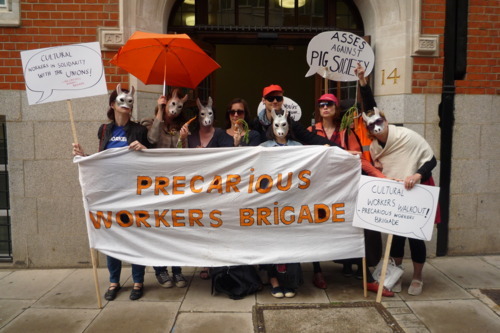
I'm not sure how or even whether the UK Precarious Workers Brigade fits into 'naming' series (or whatever I end up calling it and about which I have yet to post an already belated introduction). For now, I say yes. Consider the definition, precarious workers in culture & education, and decide for yourself. Including creative workers (how Gramsci) expands scope and should remind us that college instructors in creative disciplines are predominantly adjunct/contingent faculty. Further, the precariat identifies with other labor areas defined below
The Precariat: The New Dangerous Class … "Unlike the proletariat – the industrial working class on which 20th century social democracy was built – the precariat's relations of production are defined by partial involvement in labour combined with extensive 'work-for-labour', a growing array of unremunerated activities that are essential if they are to retain access to jobs and to decent earnings." Guy Standing
I came across the page just today, serendipity via a link post at Defend Education Ohio, just one of many in the Defend Public Education network. All are now in my feed reader: expect to see more of them,
Selections from Related Clippings (note inclusion of How the University Works)
Article: 'Welfare reform: government backs system of working in 'slivers of time' (The Guardian, 14 Nov 2010):
Ultra-flexible work system, which allows people to sell their labour in small blocks of time, is placed at the heart of the government's welfare reforms
Reader: 'Precarious Reader' (Mute Vol 2#0, 2005):
"This Reader collects texts which address the problems and potentials of the concept of precarious labour. It reflects something of the current discussion and debate around social precariousness, precarious work, precarious life, and the struggles against this condition.
Book: 'Precarious Rhapsody. Semiocapitalism and the pathologies of the post-alpha generation' (Franco 'Bifo' Berardi, 2010. Autonomedia)
"The worker no longer exists as a person. He or she is only an interchangeable producer of microfragments of recombinant semiosis that enter into the continuous flux of the Net. Capital no longer pays for the availability of a worker to be exploited for a long period of time; it no longer pays a salary that covers the entire range of economic needs of a person who works. The worker (a machine endowed with a brain that can be used for fragments of time) becomes paid for his or her occasional, temporary services. Work time is fragmented and cellularized. Cells of time are for sale on the Net and businesses can buy as much as they want without being obligated in any way in the social protection of the worker.
The intense and prolonged investment of mental and libidinal energies in the labor process has created the conditions for a psychic collapse that is transferred into the economic field with the recession and the fall in demand and into the political field in the form of military aggressivity. The use of the word collapse is not as a metaphor but as a clinical description of what is happening in the occidental mind."
Paper: 'The New Geography of Work - Power to the Precarious?' (Andrew Ross, Theory, Culture & Society, December 2008 vol. 25 no. 7-8 31-49)
"Though they occupy opposite ends of the labor market hierarchy, workers in retail and low-end services and the `creative class' temping in high-end knowledge sectors share certain elements of precarious, or nonstandard employment. While these different segments have existential conditions in common, is there any reason to imagine that they interpret or experience them in similar ways? And, even if they do, is there enough commonality to forge a political coalition of interest against the class polarization associated with economic liberalization?"
Paper: 'Clubs to Companies; Notes on the Decline of Political Culture in Speeded Up Creative Worlds' (Angela McRobbie. Cultural Studies, Volume 16, Number 4, 1 July 2002. pp516-531)
Book: 'How the University Works: Higher Education and the Low-Wage Nation' (Marc Bousquet, 2007. New York: New York University Press):
As much as we think we know about the modern university, very little has been said about what it's like to work there. Instead of the high-wage, high-profit world of knowledge work, most campus employees, including the vast majority of faculty, really work in the low-wage, low-profit sphere of the service economy. Tenure-track positions are at an all-time low, with adjuncts and graduate students teaching the majority of courses. This super-exploited corps of disposable workers commonly earn fewer than $16,000 annually, without benefits, teaching as many as eight classes per year. Even undergraduates are being exploited as a low-cost, disposable workforce."
Paper: 'Governmentality and Self-Precarization - On the normalization of cultural producers'(Isabell Lorey, 2006. Transform eipcp.net)
Thank you for the post and for these links!
ReplyDeleteanytime - good blog, happy to link it and have it on my reader. sounds like you are in Louisiana ~ I grew up in south Louisiana and was at UL Lafayette
ReplyDelete